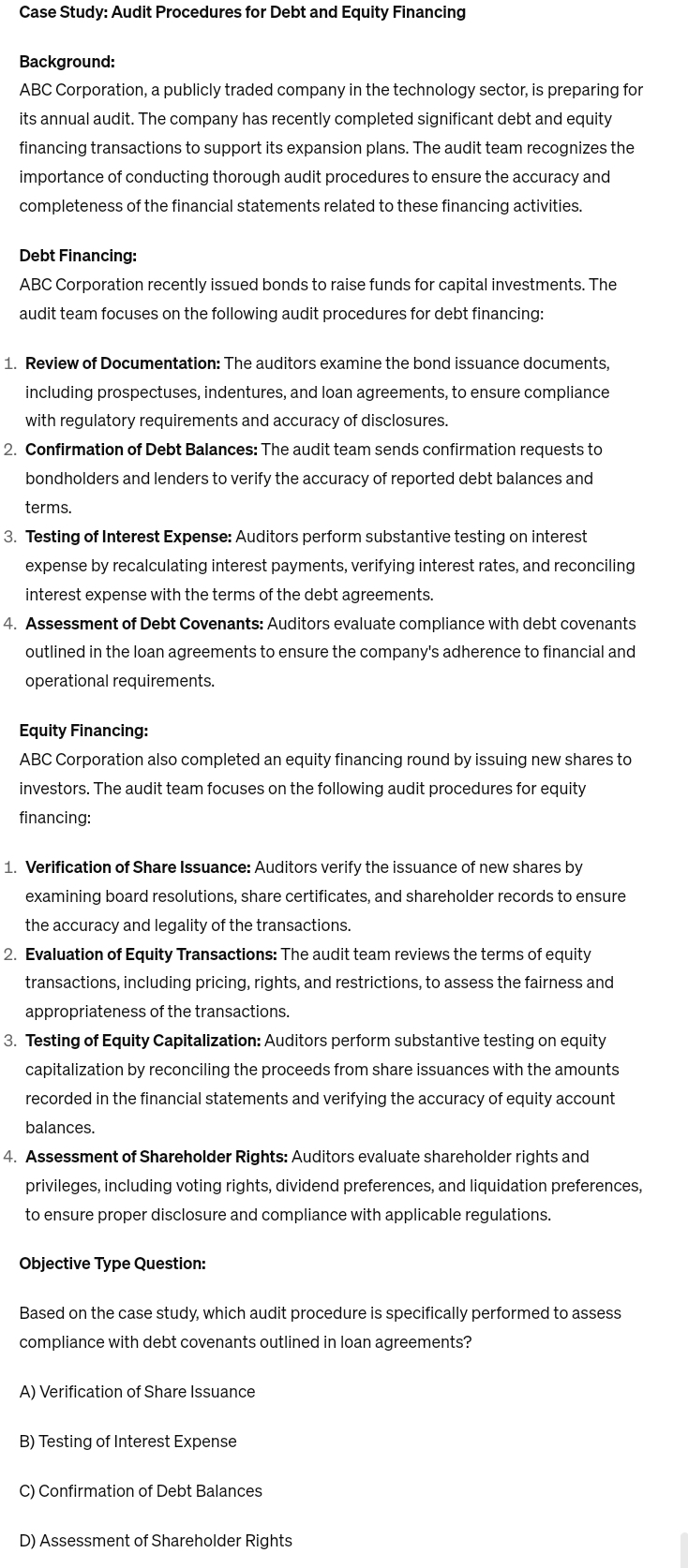Answered step by step
Verified Expert Solution
Question
1 Approved Answer
Case Study: Audit Procedures for Debt and Equity Financing Background: ABC Corporation, a publicly traded company in the technology sector, is preparing for its annual
Case Study: Audit Procedures for Debt and Equity Financing
Background:
ABC Corporation, a publicly traded company in the technology sector, is preparing for its annual audit. The company has recently completed significant debt and equity financing transactions to support its expansion plans. The audit team recognizes the importance of conducting thorough audit procedures to ensure the accuracy and completeness of the financial statements related to these financing activities.
Debt Financing:
ABC Corporation recently issued bonds to raise funds for capital investments. The audit team focuses on the following audit procedures for debt financing:
Review of Documentation: The auditors examine the bond issuance documents, including prospectuses, indentures, and loan agreements, to ensure compliance with regulatory requirements and accuracy of disclosures.
Confirmation of Debt Balances: The audit team sends confirmation requests to bondholders and lenders to verify the accuracy of reported debt balances and terms.
Testing of Interest Expense: Auditors perform substantive testing on interest expense by recalculating interest payments, verifying interest rates, and reconciling interest expense with the terms of the debt agreements.
Assessment of Debt Covenants: Auditors evaluate compliance with debt covenants outlined in the loan agreements to ensure the company's adherence to financial and operational requirements.
Equity Financing:
ABC Corporation also completed an equity financing round by issuing new shares to investors. The audit team focuses on the following audit procedures for equity financing:
Verification of Share Issuance: Auditors verify the issuance of new shares by examining board resolutions, share certificates, and shareholder records to ensure the accuracy and legality of the transactions.
Evaluation of Equity Transactions: The audit team reviews the terms of equity transactions, including pricing, rights, and restrictions, to assess the fairness and appropriateness of the transactions.
Testing of Equity Capitalization: Auditors perform substantive testing on equity capitalization by reconciling the proceeds from share issuances with the amounts recorded in the financial statements and verifying the accuracy of equity account balances.
Assessment of Shareholder Rights: Auditors evaluate shareholder rights and privileges, including voting rights, dividend preferences, and liquidation preferences, to ensure proper disclosure and compliance with applicable regulations.
Objective Type Question:
Based on the case study, which audit procedure is specifically performed to assess compliance with debt covenants outlined in loan agreements?
A Verification of Share Issuance
B Testing of Interest Expense
C Confirmation of Debt Balances
D Assessment of Shareholder Rights

Step by Step Solution
There are 3 Steps involved in it
Step: 1

Get Instant Access to Expert-Tailored Solutions
See step-by-step solutions with expert insights and AI powered tools for academic success
Step: 2

Step: 3

Ace Your Homework with AI
Get the answers you need in no time with our AI-driven, step-by-step assistance
Get Started


